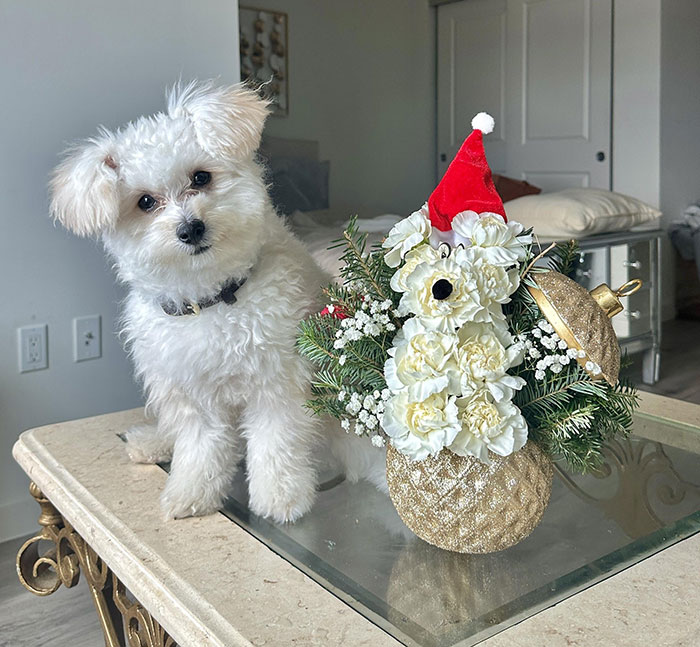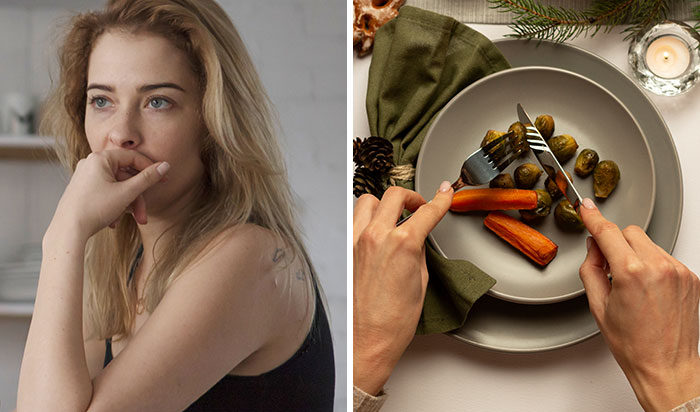The Pomapoo is a delightful mix of Pomeranian and Poodle, often the toy poodle. It first started appearing in recent decades with the rise of the designer dog trend.
This intentional crossbreeding gained popularity as breeders aimed to combine the wanted traits of the Pomeranian and Poodle breeds. While not officially recognized as purebred, the Pomapoo has become a sought-after companion dog for those looking for a small, intelligent, and affectionate pup.
The breed’s history reflects the ongoing and changing preferences in what we look for in our dogs.
The information provided herein is for informational purposes only. Please refer to our disclaimer for more details..
- Is This Canine Even a Real Breed?
- Size and Appearance of The Pomapoo
- Breed Temperament of the Pomapoo Breed
- Pomsky Health Conditions
- Breed Care and Grooming of a Pomapoo
- All You Need To Know About Pomapoo Training and Socializing
- What Is The Right Breed for You?
- Where To Get a Pomapoo
- Conclusion
- Frequently Asked Questions (FAQ) About Pomapoos
- What is a Pomapoo?
- Are Pomapoos hypoallergenic?
- What is the average size of a Pomapoo?
- What is the temperament of Pomapoos?
- Do Pomapoos require a lot of exercise?
- Are Pomapoos good with children?
- How do I groom a Pomapoo?
- Where can I get a Pomapoo?
- Are there health concerns with Pomapoos?
- Are Pomapoos easy to train?
Is This Canine Even a Real Breed?
The Pomapoo is not a recognized purebred but a designer breed, resulting from the intentional crossbreeding of Pomeranians and Poodles.
As a mixed breed, it’s important to note that individual Pomapoos may vary significantly in appearance and temperament, and potential owners should be aware that the characteristics and health issues of each Pomapoo can be unpredictable.
Size and Appearance of The Pomapoo
Image credit: Positive-Writing-176
The size and appearance of the Pomapoo can vary widely due to its mixed parentage of Pomeranian and Poodle. On average, they stand between 8 and 10 inches (20 to 25 cm) tall at the shoulder and weigh approximately 5 to 15 pounds (2 to 7 kg).
However, individual Pomapoos may fall outside these averages depending on the type of Poodle parent.
The fur is typically fluffy and may be curly or straight. Hypoallergenic qualities are not guaranteed, and owners should proceed with care if they wish for a truly hypoallergenic dog.
Prospective owners should also prepare for a range of appearances within the breed, both in terms of size and coat type.
Breed Temperament of the Pomapoo Breed
When mixing two breeds, there is no standardization for size, colour, or temperament. But, with the increase in popularity over recent years, it is, luckily, easier to a certain degree to determine how a Pomapoo puppy will turn out as it grows older.
The Pomapoo Temperament
Pomapoo temperament tends to be a delightful mix of a playful and affectionate dog, and most are known for their loving nature. Pomapoos thrive on spending quality time with their families, and these small bundles of joy form strong bonds with their human companions, often seeking attention and happily going along with family activities.
Their playful demeanour adds a lively dynamic to the household; however, some Pomapoos can be pretty vocal, expressing themselves through barks and yips. While this vocalization is often a means of communication, it can be an issue for some owners.
However, whether cuddling on the couch or engaging in interactive play, Pomapoos are devoted to their families, making them excellent furry friends for those seeking affectionate and engaging pets.
Exercise Needs
Pomapoos are, of course, all unique, with varying energy levels. However, as a rule, they tend to be quite active dogs. It is, therefore, essential that they receive plenty of exercise to stay happy.
Ensuring adequate exercise for your Pomapoo is not just about physical health; it’s also crucial for their mental well-being. Dogs, by nature, have instincts that involve running and exploring. Regular exercise is a must for Pomapoos, especially those with pronounced genes from their Poodle parent.
This breed may exhibit high energy levels, and without sufficient physical activity, they might become restless or display behavioural issues.
Engage your Pomapoo in daily walks, trips to the dog park, interactive play, and mentally stimulating tricks games. Trips to open spaces for off-leash running can also be beneficial.
Understanding and meeting your Pomapoo’s exercise needs maintains their health and contributes to a happy and well-adjusted pup.
Pomsky Health Conditions
Image credit: Jvdkieft
The Pomapoo, is a mixed breed dog, between a Pomeranian and a Poodle, doesn’t have standardized characteristics, and health issues can vary. If you are ever worried we recommend you take your Pomapoo to a vet.
Dental Health
Dental health is paramount for Pomapoos, as their small size makes them prone to dental problems like periodontal disease. Periodontosis, a severe form of gum disease, can lead to tooth loss and affect the dog’s overall health. The bacteria from the mouth can enter the bloodstream, potentially causing systemic issues such as heart and kidney problems.
Regular dental care, include brushing, dental chews, and professional cleanings, and is crucial to prevent these complications and ensure the well-being of your Pomapoos.
Teaching your Pomapoo to accept tooth brushing can be a challenging experience. Start by introducing them to the toothbrush and toothpaste slowly. Use praise and rewards to create positive reinforcements. Make toothbrushing a calm routine and help your dog live a healthy life.
Patella Luxation
Patella luxation is a prevalent concern in small breeds such as Pomapoos. It is a condition where the kneecap dislocates from its normal position and can be pretty painful.
Symptoms of patella luxation in Pomapoos may include intermittent limbing, hopping, or favoring one leg.
Regular veterinary check-ups are crucial for early detection and appropriately managing this condition. Owners should be vigilant about any signs of discomfort and seek professional advice when necessary to ensure the well-being of their Pomapoos.
Size Discrepancy
The significant size difference between a large dog like the standard Poodle and a little dog like the Pomeranian, when bred to create Pomapoos, can contribute to potential health issues.
Breeding two dogs with such distinct sizes may result in challenges during the birthing process, increasing the risk of complications for both the mother and puppies. This is also why most Pomapoos are a mix between Pomeranian and Toy poodle.
Responsible breeding practices consider the dogs’ well-being, aiming to minimize health risks associated with extreme size variations.
Breed Care and Grooming of a Pomapoo
Image credit: Big-Beautiful2578
Grooming is an essential part of owning a Pomapoo. As with all mixed breeds, there’s no guarantee what type of fur the offspring will have, but it is likely to be a mix of the curly Poodle and the fluffy Pomeranian, which can cause a significant amount of issues if not cared for sufficiently.
When and How to Brush a Pomapoo
Brushing a Pomapoo’s coat can be both delightful and challenging. Due to the blend of Poodle and Pomeranian traits, their fur can be prone to matting. Regular brushing is essential to prevent tangles and mats, ensuring the coat stays healthy and attractive.
Most Pomapoos rarely enjoy the grooming sessions, but their unique fur texture requires a gentle and frequent touch to maintain its shine and the dog’s comfort.
Teaching your Pomapoo puppy to enjoy brushing is a gradual process. Begin by introducing the brush gently, using positive reinforcement with treats and praise. Make it a positive and enjoyable experience, associating brushing with fun. Patience and consistency will help your Pomapoo associate grooming with a good time.
Bathing and Grooming Routine
Bathing your Pomapoo is also essential to maintain its unique coat. The Poodle and Pomeranian mix fur can trap dirt, making regular baths crucial to prevent skin issues like hot spots and other diseases.
Additionally, individual Pomapoos may require grooming and trimming to prevent matting. Whether done at home or by a professional groomer, this helps keep their coat healthy and free from tangles, ensuring your Pomapoo stays comfortable and stylish.
All You Need To Know About Pomapoo Training and Socializing
Image credit: ChicagoMFL
Generally, Pomapoos tend to be social and easy-going small dogs. Still, as with all breeds, it is essential to prioritize socializing and training to ensure you have a happy family member.
Early Socialization
Early socialization is vital for your Pomapoo puppy’s development. Exposing them to various people, environments, and situations helps build confidence and positive behavior. Introducing them to different sounds, sights, and experiences will help make them into a well-rounded and adaptable adult dog. Early exposure lays the foundation for a friendly and well-behaved Pomapoo.
Positive socialization experiences for your Pomapoo puppy can include interactions with people of different ages, appearances, and voices. Exposure to parks, busy streets, and quiet spaces helps them adapt to different surroundings, and encounters with other well-behaved dogs contribute to healthy socialization.
These experiences, when approached positively, contribute to a well-socialized and confident Pomapoo.
Obedience Training
Pomapoo combines the Poodle’s intelligence with the Pomeranian’s spirited nature. Given the Poodle’s reputation for trainability, Pomapoos generally grasp commands quickly. However, the Pomeranian’s occasional stubbornness may require patience and positive reinforcement.
Consistent, reward-based training sessions help build a strong bond and an obedient Pomapoo pup.
Mental Exercises
Engaging in mental exercises is crucial for your Pomapoo’s well-being. Incorporate puzzle toys and interactive games into their routine, such as hide-and-seek with treats or regular dog training to stimulate their intelligent mind.
Exploring new places, environments, and people together can also provide mental enrichment for your Pomapoo and strengthen your bond, helping to ensure a happy and fulfilled companion.
What Is The Right Breed for You?
Selecting the right dog breed involves careful consideration to ensure a compatible match with your lifestyle. The dog’s size, energy level, grooming needs, and temperament are crucial when choosing a new four-legged friend.
Before deciding on a breed, assess your living space, daily schedule, and ability to provide necessary care, then do plenty of research on breeds or mixed breeds, like the Pomapoo, that match your preferences.
Before choosing a dog breed, it is also vital to understand the financial commitment required for dog ownership.
Before bringing a Pomapoo into your life, consider key factors to ensure it aligns with your lifestyle. Pomapoos can be vocal, and their high grooming needs demand regular attention. Assess your tolerance for both traits before choosing this breed. The positives of owning a Pomapoo include their affectionate nature, adaptability, and suitability for various living situations, whether apartments, houses, or something completely different.
Where To Get a Pomapoo
Where Can You Find a Pomapoo Breeder
When considering buying a Pomapoo puppy from a breeder, choosing the right one is crucial to ensure the health and well-being of your future puppy.
Reputable breeders prioritize the welfare of their dogs, adhering to ethical breeding practices. Before you decide, research breeders thoroughly, seeking those with positive reviews and a commitment to breeding healthy dogs.
A responsible breeder provides a loving environment, does health screenings for the parent dogs, and offers insights into the puppy’s early life. Visit the breeder if possible, ensuring the conditions are clean and the dogs are well cared for.
Most breeders will be more than open to answering questions and providing necessary documentation. Choosing the right breeder is the first step to a happy and healthy relationship with your Pomapoo.
Where Can You Adopt Pomapoo?
An animal shelter or rescue organizations, and adoption centres often have Pomapoos seeking new families. While adopting, it’s essential to understand that rehomed dogs may have unique challenges. Some dogs may have behavioral issues or health concerns.
Patience and commitment are crucial when welcoming a rehomed Pomapoo into your home, as they may require additional time and effort for adjustment.
Despite potential challenges, adopting a Pomapoo not only provides a second chance for the dog but also brings immense joy and companionship to your life.
Conclusion
In conclusion, the Pomapoo, a charming blend of Pomeranian and Poodle, can be the ideal companion. Although not officially recognized as a breed, Pomapoos have captured the hearts of those seeking a small, intelligent, and affectionate companion.
As a mixed breed, individual Pomapoos may vary, emphasizing the importance of researching reputable breeders. However, their playful temperament, vocal charm, and adaptability make Pomapoos wonderful family members.
Careful consideration, proper grooming, early socialization, and consistent training contribute to a harmonious relationship with this delightful and unique canine companion.
Whether obtained from a responsible breeder or adopted from a shelter, the joy and companionship Pomapoos bring to their families are boundless, making them a delightful choice for those ready for the rewards of canine companionship.
Frequently Asked Questions (FAQ) About Pomapoos
What is a Pomapoo?
A Pomapoo is a designer dog breed, a cross between a Pomeranian and a Poodle. This intentional mix hopes to combine the intelligence of the Poodle with the spirited nature of the Pomeranian, resulting in a small, affectionate, and lively companion.
Are Pomapoos hypoallergenic?
While Poodles are known for their hypoallergenic coat, it’s essential to note that the fur qualities in Pomapoos can vary a lot. Some may inherit the hypoallergenic trait, while others may not. Individuals with allergies should spend time with a Pomapoo before bringing one home.
What is the average size of a Pomapoo?
Pomapoos can vary in size due to their mixed parentage. On average, they stand between 8 to 10 inches (20 to 25 cm) tall at the shoulder and weigh approximately 5 to 15 pounds (2 to 7 kg). However, individual Pomapoos may fall outside these averages.
What is the temperament of Pomapoos?
Pomapoos are known for their delightful mix of affection and playfulness. They form strong bonds with their families, seeking attention and participating in various activities. However, remember that some Pomapoos can be quite vocal, and some may exhibit unwanted behaviour, especially when left alone.
Do Pomapoos require a lot of exercise?
Pomapoos are generally active dogs and benefit from regular exercise to maintain their happiness and health. Their energy levels may vary, but daily walks, interactive play, and mental stimulation are essential for their well-being.
Are Pomapoos good with children?
Most Pomapoos are known for their loving nature and often thrive in a family setting. Early socialization is vital to ensure a well-behaved and adaptable Pomapoo, especially when dealing with children. They tend to enjoy spending quality time with their human family members, making them excellent family pets.
How do I groom a Pomapoo?
Grooming a Pomapoo involves regular brushing to prevent matting, as their fur can be a mix of the curly Poodle and the fluffy Pomeranian. Bathing is also essential, and some individuals may require professional grooming to maintain a healthy and tangle-free coat.
Where can I get a Pomapoo?
You can get Pomapoos from reputable breeders or adopt from shelters, rescue organizations, and adoption centres. Choosing a responsible breeder is crucial for ensuring the health and well-being of your Pomapoo.
Are there health concerns with Pomapoos?
Pomapoos, being a Pomeranian and Poodle mix, may inherit health issues from their parent breeds. Common concerns include dental problems, patella luxation, and the size discrepancy between Poodle and Pomeranians.
Are Pomapoos easy to train?
Training a Pomapoo combines the intelligence of the Poodle with the occasional stubbornness of the Pomeranian. Consistent, reward-based training sessions are effective, and early socialization contributes to a well-behaved and responsive Pomapoo.
289views
Share on FacebookExplore more of these tags
Maybe let's not normalize rampant backyard breeding of "new" "designer" breeds that irresponsible people will look at and see dollar signs. There are plenty of dogs who are the victims of this type of totally irresponsible and greedy backyard breeding Ibeing euthanized every day in shelters.
"Pomapoo" isn't a breed. It's a mutt. A mixed-breed dog. NOT a "breed". Therefore, there is NO established, standard "temperament" or appearance that puppies/dogs of this mix will have. Even puppies in the same LITTER will differ in appearance, as they are mixed breed dogs.
Tha k you, I'm glad I'm not the only one who is bothered by this.
Load More Replies...As much I like animals. Maybe not publish 15 (ish) dog articles after each other on the same day? I came here to escape, and to look at funny things and not scroll past all the "Informative" posts without sources. Sorry
Maybe let's not normalize rampant backyard breeding of "new" "designer" breeds that irresponsible people will look at and see dollar signs. There are plenty of dogs who are the victims of this type of totally irresponsible and greedy backyard breeding Ibeing euthanized every day in shelters.
"Pomapoo" isn't a breed. It's a mutt. A mixed-breed dog. NOT a "breed". Therefore, there is NO established, standard "temperament" or appearance that puppies/dogs of this mix will have. Even puppies in the same LITTER will differ in appearance, as they are mixed breed dogs.
Tha k you, I'm glad I'm not the only one who is bothered by this.
Load More Replies...As much I like animals. Maybe not publish 15 (ish) dog articles after each other on the same day? I came here to escape, and to look at funny things and not scroll past all the "Informative" posts without sources. Sorry

 Dark Mode
Dark Mode 

 No fees, cancel anytime
No fees, cancel anytime 






















































-1
6